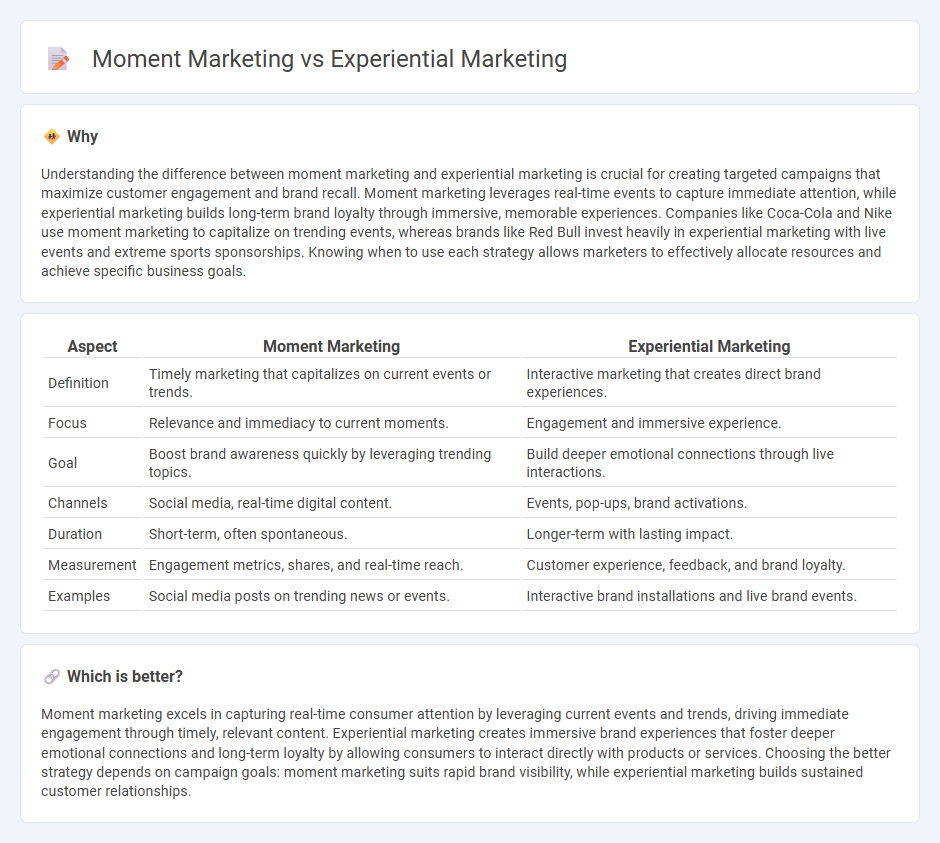
Moment marketing leverages real-time events and trends to create timely, relevant content that resonates instantly with audiences. Experiential marketing focuses on immersive brand experiences that engage consumers emotionally and physically, fostering deeper connections and long-term loyalty. Discover how combining moment marketing and experiential marketing can amplify your brand's impact and customer engagement.
Why it is important
Understanding the difference between moment marketing and experiential marketing is crucial for creating targeted campaigns that maximize customer engagement and brand recall. Moment marketing leverages real-time events to capture immediate attention, while experiential marketing builds long-term brand loyalty through immersive, memorable experiences. Companies like Coca-Cola and Nike use moment marketing to capitalize on trending events, whereas brands like Red Bull invest heavily in experiential marketing with live events and extreme sports sponsorships. Knowing when to use each strategy allows marketers to effectively allocate resources and achieve specific business goals.
Comparison Table
| Aspect | Moment Marketing | Experiential Marketing |
|---|---|---|
| Definition | Timely marketing that capitalizes on current events or trends. | Interactive marketing that creates direct brand experiences. |
| Focus | Relevance and immediacy to current moments. | Engagement and immersive experience. |
| Goal | Boost brand awareness quickly by leveraging trending topics. | Build deeper emotional connections through live interactions. |
| Channels | Social media, real-time digital content. | Events, pop-ups, brand activations. |
| Duration | Short-term, often spontaneous. | Longer-term with lasting impact. |
| Measurement | Engagement metrics, shares, and real-time reach. | Customer experience, feedback, and brand loyalty. |
| Examples | Social media posts on trending news or events. | Interactive brand installations and live brand events. |
Which is better?
Moment marketing excels in capturing real-time consumer attention by leveraging current events and trends, driving immediate engagement through timely, relevant content. Experiential marketing creates immersive brand experiences that foster deeper emotional connections and long-term loyalty by allowing consumers to interact directly with products or services. Choosing the better strategy depends on campaign goals: moment marketing suits rapid brand visibility, while experiential marketing builds sustained customer relationships.
Connection
Moment marketing leverages real-time events to engage audiences instantly, creating relevance that enhances customer experience. Experiential marketing focuses on immersive brand interactions, making moment marketing a key tactic to deliver timely, memorable experiences. Both strategies prioritize emotional connections to drive customer engagement and brand loyalty.
Key Terms
**Experiential Marketing:**
Experiential marketing engages consumers through immersive, interactive experiences that build emotional connections and brand loyalty by allowing direct participation. It leverages multisensory elements and personal involvement to create memorable, long-lasting impressions beyond traditional advertising. Explore how experiential marketing can transform your brand engagement and drive customer retention.
Brand Immersion
Experiential marketing emphasizes deep brand immersion by creating interactive, memorable experiences that engage multiple senses, fostering strong emotional connections with consumers. Moment marketing targets specific, real-time events or trends to deliver timely, relevant brand messages, often leveraging social media to capitalize on immediate consumer attention. Explore how combining both strategies can amplify brand presence and customer engagement.
Engagement
Experiential marketing creates immersive brand interactions that foster deep emotional connections and long-lasting engagement through live events, activations, and sensory experiences. Moment marketing leverages timely, culturally relevant events or trends to capture immediate attention and drive spontaneous engagement across digital platforms. Discover how strategic integration of both approaches can amplify overall brand engagement effectively.
Source and External Links
What Is Experiential Marketing? - Limelight Platform - Experiential marketing is a strategy that engages consumers through live, immersive experiences, turning passive audiences into active participants and building emotional connections with brands.
Engagement marketing - Wikipedia - Experiential marketing involves creating memorable, physical, and interactive experiences that connect customers to brands, shaping positive customer attitudes, mood, and behaviors while differentiating the brand from competitors.
What is experiential marketing? Definition and examples - Amazon Ads - Experiential marketing connects brands with consumers via direct experiences ranging from pop-ups and live events to virtual events, designed to be memorable, measurable, and aligned with brand goals.
 dowidth.com
dowidth.com